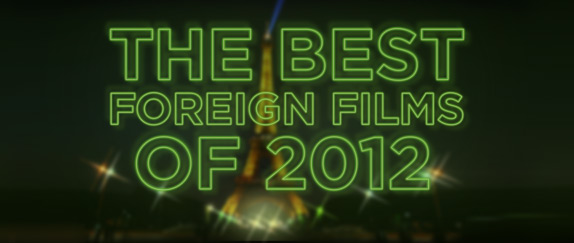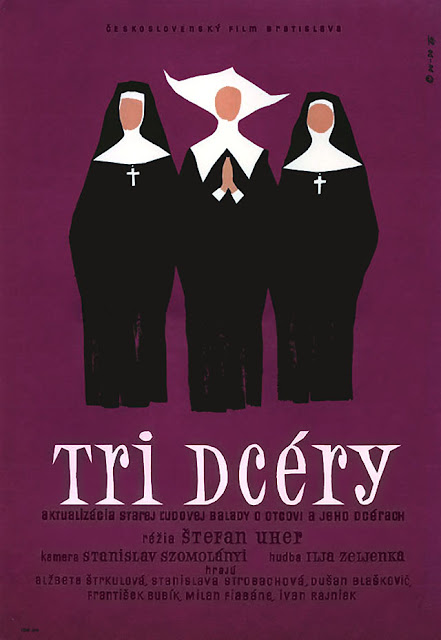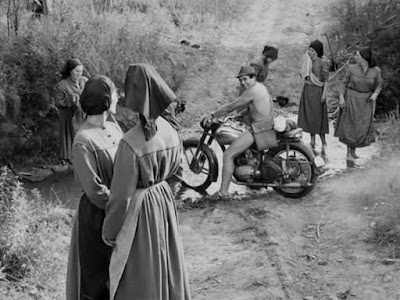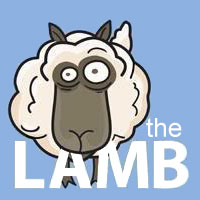Three Daughters • Tri dcéry (1968)

Genre: Drama
Director: Stefan Uher
Starring: Jozef Cierny, Alžbeta Štrkuová, Stanislava Strobachová, Dušan Blaškovic, Milan Fiabane
Language: Czech
Duration: 86 min.
Summary:
Following WWII, a wealthy farmer who sent his three daughters to a convent in order to give all his land to his only son, finds himself homeless, poor, and seeking refuge with the daughters he shunned long ago.
Three Daughters is a film by Slovak director Štefan Uher, written by Alfonz Bednár. The third of six films the pair made together. A fruitful partnership that began with The Sun in a Net, the film many consider to be the first of the Czechoslovak New Wave.
Like Karel Kachyna's Night of the Bride, this film also deals with the effects of collectivization in Czechoslovakia during the early 1950s. Old man Majda (Jozef Cierny), was once a rich farmer, a kulak who before the war sent his three daughters to a convent so that his only son could one day inherit all of his land. Now he finds himself without land to give, and cruelly dispatched to a non-existent village by the Communists. His wife and son no longer want anything to do with him, so off he goes, suitcase in hand, hoping to find shelter with his daughters.
Their plight is not much better. With their convent abolished, they are split up and forced into manual labor. His only hope is the youngest, Klemencia (Alžbeta Štrkuová), who still lives and works the fields with a group of sisters from the convent. However, her group is also facing much adversity from the local party authorities trying to indoctrinate them into the fold.
It's less surreal than Uher's previous film The Miraculous Virgin, but has much of the same elements as his other work with Bednár. A combination of an intricate story, powerful lyrical imagery, and complex emotions touching on religious and political themes. It's also an example of cinematic influences gone full circle, it's set in the Czech speaking region of Moravia, and has a lot of the dry humor and biting satire that his Czech counterparts were more known for. Some of the scenes here are reminiscent of Forman's The Firemen's Ball.
The story of the father, really serves as a frame surrounding the real story which focuses on young Klemencia and her sisters of the faith. The Communist committee, are concerned that this group of former nuns are a dangerous influence on the community and try to think up ways to neutralize this perceived threat. Here is where the brilliance of the screenplay exhibits itself, and it spares no one. Each time the cronies come up with a brilliant plan, it fails with hilarious irony, only serving to highlight the inherent flaws and hypocrisies of both political and religious dogmas. It's the case of the ones in power, exerting their power in order to remain in place, drawing poignant parallels from the actions of rich landowner, government official, and mother superior.
I should also mention the recurring use of the same folk song, heard multiple times in the film. It's a song we hear sung throughout by the town fool Janohop (Pavel Chrobak), and each time the lyrics evoke a different emotion. Ranging anywhere from amusing delight to disturbing outrage. It's quite an interesting an effective technique. Music is credited to Ilja Zeljenka, a frequent collaborator of Uher's, but I'm not sure if this is an original or a common song.
Unfortunately one storyline totally eclipses the other, and I feel there isn't enough development to really get us invested completely in the fates of the characters. It does have a very clever screenplay and provides some fascinating insight into a tragic and misguided page of history, but is unlikely to appeal to anyone unfamiliar with the times.
Like Karel Kachyna's Night of the Bride, this film also deals with the effects of collectivization in Czechoslovakia during the early 1950s. Old man Majda (Jozef Cierny), was once a rich farmer, a kulak who before the war sent his three daughters to a convent so that his only son could one day inherit all of his land. Now he finds himself without land to give, and cruelly dispatched to a non-existent village by the Communists. His wife and son no longer want anything to do with him, so off he goes, suitcase in hand, hoping to find shelter with his daughters.
Their plight is not much better. With their convent abolished, they are split up and forced into manual labor. His only hope is the youngest, Klemencia (Alžbeta Štrkuová), who still lives and works the fields with a group of sisters from the convent. However, her group is also facing much adversity from the local party authorities trying to indoctrinate them into the fold.
It's less surreal than Uher's previous film The Miraculous Virgin, but has much of the same elements as his other work with Bednár. A combination of an intricate story, powerful lyrical imagery, and complex emotions touching on religious and political themes. It's also an example of cinematic influences gone full circle, it's set in the Czech speaking region of Moravia, and has a lot of the dry humor and biting satire that his Czech counterparts were more known for. Some of the scenes here are reminiscent of Forman's The Firemen's Ball.
The story of the father, really serves as a frame surrounding the real story which focuses on young Klemencia and her sisters of the faith. The Communist committee, are concerned that this group of former nuns are a dangerous influence on the community and try to think up ways to neutralize this perceived threat. Here is where the brilliance of the screenplay exhibits itself, and it spares no one. Each time the cronies come up with a brilliant plan, it fails with hilarious irony, only serving to highlight the inherent flaws and hypocrisies of both political and religious dogmas. It's the case of the ones in power, exerting their power in order to remain in place, drawing poignant parallels from the actions of rich landowner, government official, and mother superior.
I should also mention the recurring use of the same folk song, heard multiple times in the film. It's a song we hear sung throughout by the town fool Janohop (Pavel Chrobak), and each time the lyrics evoke a different emotion. Ranging anywhere from amusing delight to disturbing outrage. It's quite an interesting an effective technique. Music is credited to Ilja Zeljenka, a frequent collaborator of Uher's, but I'm not sure if this is an original or a common song.
Unfortunately one storyline totally eclipses the other, and I feel there isn't enough development to really get us invested completely in the fates of the characters. It does have a very clever screenplay and provides some fascinating insight into a tragic and misguided page of history, but is unlikely to appeal to anyone unfamiliar with the times.
— Bonjour Tristesse






























6 comments:
I love the lightness of feel in the Czech new wave - so different from the French new wave (which I also love) going on at the same time. The Prague spring must have been a jubilant time, when people felt they'd reclaimed their words. So Many of these lovely films easily and happily make light of something that was so terrifying and dangerous just a few years earlier. Politics, for all its frustrations, does have the power to cause miraculous and instant change in a way nothing else can. Films like this one must have been such an encouragement to laugh to the people of Prague - maybe these film makers felt they wanted to teach their people to be happy again.
Interesting review of a movie I'm surely never to see aside, those are some great posters. I don't suppose there's much information on the artist?
I feel that they were all first influenced and encouraged by what the French were doing, breaking conventions, but with their own wonderful brand of storytelling and sense of humor. You really do get the feeling watching these now, that these filmmakers felt free to do as they pleased. Of course it's a double edged sword, because the money to make all these films was likely coming from the backs of all the laborers, but at least they were able to create something beautiful from an ugly situation.
Nothing I could find except for the names Dudeška, Dobrovolný. If you do a Google Image Search on them, it'll come up with a ton of other interesting posters from the era.
Ah well, we'll see. I was actually thinking it looked like a bit of fun. The summary amused me.. Save it for later on; if anything.
Not quite fun, but it does have its share of amusing moments.
Post a Comment